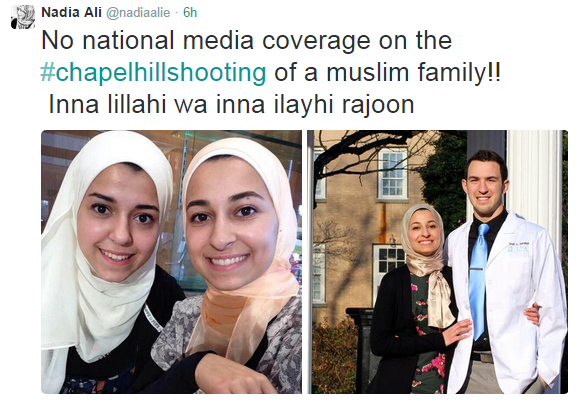How North Carolina murders sparked global outrage
- Published

Thousands of people online shared images of the victims and expressed anger with media coverage
Was the murder of three students in the US given enough media coverage?
Three young students in the college town of Chapel Hill in North Carolina were shot dead on Tuesday. According to reports, the victims were students at nearby universities, external, from Muslim faith backgrounds and were related to each other - 23-year-old Deah Shaddy Barakat, his wife, Yusor Mohammad Abu-Salha, 21, and her sister, Razan Mohammad Abu-Salha, 19. A man named Craig Stephen Hicks, 46, has been arrested in connection with the case. He has expressed atheist views on Facebook, according to reports.
Initially few further details were known about the case. In a statement on Wednesday, Chapel Hill Police said an ongoing parking dispute apparently led to the shooting, a theory which has been rejected by the father of the Abu-Salha sisters. Dr. Mohammad Abu-Salha is reported, external to have said the incident was not parking related and described it as a "hate crime".
Activists online have accused major media outlets of failing to adequately cover the shootings.
The hashtag #ChapelHillShooting has been used more than 900,000 times and was trending not only in the US but also in the UK, Egypt, Saudi Arabia and several other Middle Eastern countries. An Arabic hashtag, which translates as 'Chapel Hill Massacre', was also trending with almost 33,000 tweets.
The tag seems to have been started by Abed A. Ayoub, the legal and policy director of the American-Arab Anti-Discrimination Committee. "Please keep the family of the victims in #ChapelHill in your thoughts and prayers. Senseless violence," was the first, external tweet. As the tag spread, he and other users began to put forward the argument that the faith of the victims was limiting coverage of the case. "Why hasn't anyone called the #ChapelHillShooting an act of terrorism? Are the victims the wrong religion?" he later tweeted.
Meanwhile the hashtag #MuslimLivesMatter was mentioned almost 100,000 times in the day following the shooting. One of the earliest users of the hashtag was Vicki Walden, a woman from Missouri who describes herself as "#WhitePrivilege standing in solidarity for the #BlackLivesMatter movement."
"Muslims only newsworthy when behind a gun. Not in front [of] it," one typical tweet read, external.
The case has now been covered by both local and international media.
More from Trending:
How Vietnamese rap got political
Espionage case puts metadata on trial
Watch more videos on our YouTube channel, external or follow BBC Trending on Twitter @BBCtrending, external.
All our stories are at bbc.com/trending